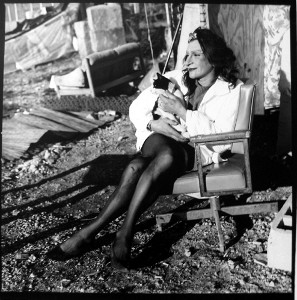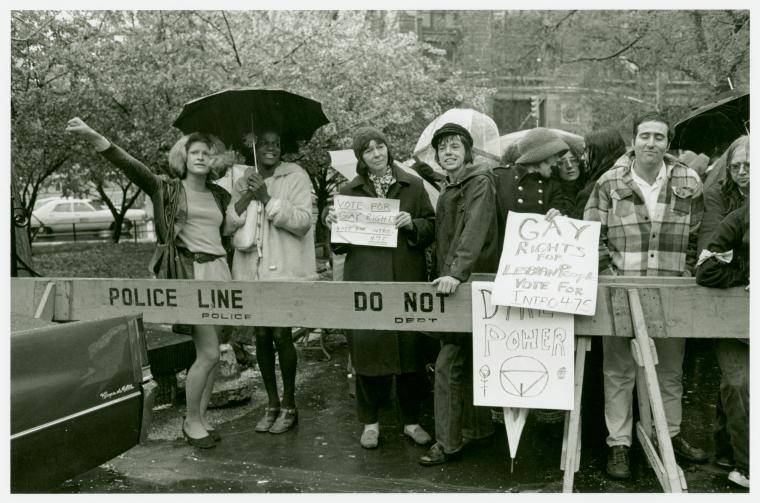You can’t talk about Marsha P Johnson without talking about Sylvia Rivera. The two friends were passionate activists for transgender/non-gender conforming rights and were advocates for LGBT youth, especially the homeless. Sylvia was inspired during the Stonewall riots by the thought of revolution. She thought the revolution was happening and she wanted to be there for it. While there is still inconclusive evidence that Sylvia was at Stonewall during the riots, what is important to remember is what she did after the riots and during her lifetime that matters.
Sylvia was born Ray Rivera in New York City on July 2nd, 1951. Sylvia had a tumultuous youth growing up in the Bronx as her mother dealt with two difficult and often dangerous marriages. Her stepfather threatened to kill them when she was three. Unfortunately, she would lose her mother soon afterward to suicide. She tried to kill Sylvia too by offered the rat poisoned laced milk she was consuming to her too. Sylvia survived the poisoning but her mother did not. She was sent to live with her maternal grandmother. This new living arrangement was not quite an improvement on her life.
Being half Puerto Rican and half Venezuelan made life with her Venezuelan grandma, Viejita, challenging. Her grandmother didn’t like the dark skin she inherited from her equally dark-skinned father. Viejita also didn’t like her effeminate mannerisms. It also didn’t help when her father took Sylvia’s half-sister Sonia away, leaving her grandmother with the grandchild she didn’t want. She still took care of Sylvia but in a very strict environment, often resorting to beating Sylvia in a desperate attempt to normalize her. She went to all white Catholic schools, to a Catholic boarding school when her grandmother fell ill, and shuffled around to other homes of friend and relatives. She started wearing makeup to school in the 4th grade and dealt with some teasing at school, but the most abuse came from people in the neighborhood. She finally ran away from home at age 10.
Sylvia wound up on 42nd street and relied on sex work support herself. She was already no stranger to sex work as she had previously hustled with her uncle. She was taken in by the local drag community and changed her name to Sylvia. Her years in Times Square started in 1961, a tough time to be gay much less trans. She was also homeless and struggled with addiction. She often went to jail where beatings and sexual assault were common. Later in the 60s, Sylvia started to feel the draw to activism and more openly identified as a drag queen. Sylvia was just 17 during the Stonewall riots. She knew it was time to stop taking the harassment, beatings, and abuse. It was time to fight. She joined the Gay Liberation Front and the Gay Activist Alliance; both organizations formed after Stonewall. Unfortunately, she found a reluctance to support cross-dressers and transgender people.
After the Weinstein Hall sit-in, Sylvia and Marsha P Johnson started the Street Transvestite Action Revolutionaries in 1970. STAR helped young drag queens and trans youth with food and shelter. Sylvia spent her time helping the poor, the homeless, the people of color, and the gender non-conformists. She and Marsha looked after street kids struggling to survive around the Christopher Street docks. They put them up in their hotel rooms and even tried using an abandoned tracker trailer until the owner recovered it with the street kids still inside. Eventually, they rented a house owned by the mafia that became known as STAR House. STAR House had lasted two years before they were forced to leave. In that time they fed and housed as many people as they could. She and Marsha hustled on the streets to make money to provide for them so they could stay off the streets. They ran STAR as a collective with everyone helping to provide food and supplies. By 1973, with no place to house anyone, STAR was disbanded.
Being a trans into poor sex worker, Sylvia increasingly felt left out of the mainstream-leaning early gay rights movement but continued to find ways to fight. She was the only person arrested while gathering signatures for a proposed gay rights bill, a bill that eventually took out all mention of transgender rights in an attempt to please lawmakers and increase the possibility of it passing. It took 15 more years to pass, and trans rights were still left out. Sylvia even had to force her way to the microphone to speak during Pride. A group led by Jean O’Leary found men dressed as women offensive and tried to deny her access to the stage. Well, she did get there and had some enlightening words to share about the divisiveness of the gay rights movement.
All this was too much for Sylvia after a while, and she tried to commit suicide in 1974. She moved to Tarrytown where she worked a regular job, went to Pride events, and stayed under the radar for a while. She moved back to New York in early 90’s but tried to kill herself again in 1995 by walking into the Hudson River. Marsha’s body had been found in the Hudson River 3 years before, and despite writing a beautiful obituary for her, Sylvia felt Marsha was never appreciated for her work. Surviving this suicide attempt, she reignited her passion for activism. In 1999, Sylvia was invited to speak the World Pride Celebration in Italy and restarted STAR in 2001, changing transvestite to transgender. She also was an advocate for Amanda Milan, pressing for an investigation into her murder and helping with the funeral.
Sylvia passed away in 2002 from liver cancer. She lived the last years of her life at Transy House Collective, a house in Brooklyn run in the spirit of STAR house, and run by a former STAR resident. Her legacy lives on with the Sylvia Rivera Law Project, an organization that assists transgender, intersex, and gender variant people. Also, the corner of Christopher Street and Hudson Street is named Sylvia Rivera Way in her honor. She’s often called The Rosa Parks of the Modern Transgender Movement. She and Marsha were almost forgotten but thankfully their work for the community is now remembered and celebrated.



